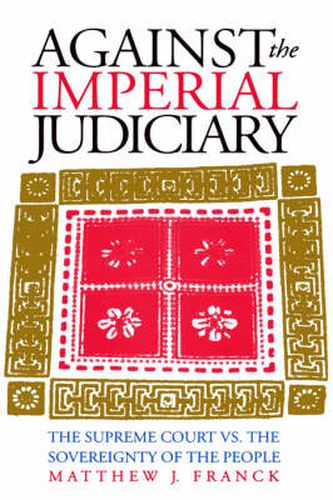Readings Newsletter
Become a Readings Member to make your shopping experience even easier.
Sign in or sign up for free!
You’re not far away from qualifying for FREE standard shipping within Australia
You’ve qualified for FREE standard shipping within Australia
The cart is loading…






In this fresh and provocative critique of judicial power, Matthew Franck argues for a Supreme Court that is newly mindful of constitutionalism’s basis in the sovereign will of the people and of the distinctly limited scope of judicial authority that is permitted by that constitutional sovereignty. Neither activism nor restraint, but a lively sense of the fundamental constraints that deprive the Court of any legitimate choice between those two options, is at the heart of Franck’s model of appropriate judicial modesty Franck challenges three propositions central to current debates over the Supreme Court’s role in American life: that the Court has the final word in interpreting the Constitution above competing views from other government branches; that it may legitimately initiate actions to correct political or social dysfunctions left uncorrected by those branches; and that constitutional decisions may be grounded in natural law or a higher law located beyond the text of the Constitution.
Franck claims that these erroneous propositions have allowed the Court’s power to grow well beyond its constitutional mandate. He persuasively argues that a more accurate and responsible view of judicial power can be revived by reexamining the Framers’ thought, the writings of liberal philosophers (especially Hobbes, Locke, and Blackstone), and the early opinions of the Supreme Court.
His reasoned critique provides illuminating new perspectives on the jurisprudence of John Marshall; on the origins and practices of judicial statesmanship (presumed to have begun with Marshall); on McCulloch v. Maryland (1819)-which was not, Franck argues, a ruling in pursuit of a nationalist political agenda but conformed to a modest vision of the judicial power; and on the mangled roots of substantive due process. In addition, he reviews recent Supreme Court confirmation hearings to demonstrate the large influence of historical misconceptions on our understanding of the proper scope of judicial power in a constitutional democracy.
$9.00 standard shipping within Australia
FREE standard shipping within Australia for orders over $100.00
Express & International shipping calculated at checkout
In this fresh and provocative critique of judicial power, Matthew Franck argues for a Supreme Court that is newly mindful of constitutionalism’s basis in the sovereign will of the people and of the distinctly limited scope of judicial authority that is permitted by that constitutional sovereignty. Neither activism nor restraint, but a lively sense of the fundamental constraints that deprive the Court of any legitimate choice between those two options, is at the heart of Franck’s model of appropriate judicial modesty Franck challenges three propositions central to current debates over the Supreme Court’s role in American life: that the Court has the final word in interpreting the Constitution above competing views from other government branches; that it may legitimately initiate actions to correct political or social dysfunctions left uncorrected by those branches; and that constitutional decisions may be grounded in natural law or a higher law located beyond the text of the Constitution.
Franck claims that these erroneous propositions have allowed the Court’s power to grow well beyond its constitutional mandate. He persuasively argues that a more accurate and responsible view of judicial power can be revived by reexamining the Framers’ thought, the writings of liberal philosophers (especially Hobbes, Locke, and Blackstone), and the early opinions of the Supreme Court.
His reasoned critique provides illuminating new perspectives on the jurisprudence of John Marshall; on the origins and practices of judicial statesmanship (presumed to have begun with Marshall); on McCulloch v. Maryland (1819)-which was not, Franck argues, a ruling in pursuit of a nationalist political agenda but conformed to a modest vision of the judicial power; and on the mangled roots of substantive due process. In addition, he reviews recent Supreme Court confirmation hearings to demonstrate the large influence of historical misconceptions on our understanding of the proper scope of judicial power in a constitutional democracy.